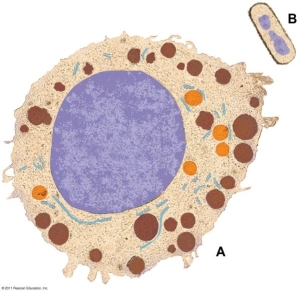Exam 1: Introduction: Evolution and Themes of Biology
Exam 1: Introduction: Evolution and Themes of Biology77 Questions
Exam 2: The Chemical Context of Life98 Questions
Exam 3: Water and Life92 Questions
Exam 4: Carbon and the Molecular Diversity of Life86 Questions
Exam 5: The Structure and Function of Large Biological Molecules131 Questions
Exam 6: A Tour of the Cell111 Questions
Exam 7: Membrane Structure and Function88 Questions
Exam 8: An Introduction to Metabolism92 Questions
Exam 9: Cellular Respiration and Fermentation128 Questions
Exam 10: Photosynthesis103 Questions
Exam 11: Cell Communication85 Questions
Exam 12: The Cell Cycle98 Questions
Exam 13: Meiosis and Sexual Life Cycles90 Questions
Exam 14: Mendel and the Gene Idea92 Questions
Exam 15: The Chromosomal Basis of Inheritance75 Questions
Exam 16: The Molecular Basis of Inheritance84 Questions
Exam 17: From Gene to Protein106 Questions
Exam 18: Regulation of Gene Expression116 Questions
Exam 19: Viruses71 Questions
Exam 20: DNA Tools and Biotechnology78 Questions
Exam 21: Genomes and Their Evolution64 Questions
Exam 22: Descent with Modification: A Darwinian View of Life68 Questions
Exam 23: The Evolution of Populations92 Questions
Exam 24: The Origin of Species76 Questions
Exam 25: The History of Life on Earth89 Questions
Exam 26: Phylogeny and the Tree of Life91 Questions
Exam 27: Bacteria and Archaea96 Questions
Exam 28: Protists82 Questions
Exam 29: Plant Diversity I: How Plants Colonized Land93 Questions
Exam 30: Plant Diversity II: The Evolution of Seed Plants119 Questions
Exam 31: Fungi105 Questions
Exam 32: An Overview of Animal Diversity93 Questions
Exam 33: An Introduction to Invertebrates111 Questions
Exam 34: The Origin and Evolution of Vertebrates126 Questions
Exam 35: Plant Structure,Growth,and Development82 Questions
Exam 36: Resource Acquisition and Transport in Vascular Plants100 Questions
Exam 37: Soil and Plant Nutrition99 Questions
Exam 38: Angiosperm Reproduction and Biotechnology107 Questions
Exam 39: Plant Responses to Internal and External Signals137 Questions
Exam 40: Basic Principles of Animal Form and Function98 Questions
Exam 41: Animal Nutrition87 Questions
Exam 42: Circulation and Gas Exchange112 Questions
Exam 43: The Immune System123 Questions
Exam 44: Osmoregulation and Excretion91 Questions
Exam 45: Hormones and the Endocrine System92 Questions
Exam 46: Animal Reproduction104 Questions
Exam 47: Animal Development106 Questions
Exam 48: Neurons,Synapses,and Signalling93 Questions
Exam 49: Nervous Systems85 Questions
Exam 50: Sensory and Motor Mechanisms106 Questions
Exam 51: Animal Behaviour91 Questions
Exam 52: An Introduction to Ecology and the Biosphere90 Questions
Exam 53: Population Ecology89 Questions
Exam 54: Community Ecology97 Questions
Exam 55: Ecosystems and Restoration Ecology98 Questions
Exam 56: Conservation Biology and Global Change90 Questions
Select questions type
When you conduct research at a community level,you are generally interested in which major biological theme?
(Multiple Choice)
4.9/5  (35)
(35)
To understand the chemical basis of inheritance,we must understand the molecular structure of DNA.This is an example of the application of which concept to the study of biology?
(Multiple Choice)
4.8/5  (31)
(31)
Use the following information to answer the questions below.
 -How do we know that Figure A is an eukaryote?
-How do we know that Figure A is an eukaryote?
(Multiple Choice)
4.8/5  (24)
(24)
What does Darwin's proposed mechanism of natural selection require?
(Multiple Choice)
4.9/5  (29)
(29)
Global warming,as demonstrated by observations such as melting of glaciers,increasing CO₂ levels,and increasing average ambient temperatures,has already had many effects on living organisms.Which of the following might best offer a solution to this problem?
(Multiple Choice)
4.8/5  (31)
(31)
Which of the following types of cells utilize deoxyribonucleic acid (DNA)as their genetic material but do not have their DNA encased within a nucleus?
(Multiple Choice)
4.9/5  (32)
(32)
Which of the following is the best description of a control for an experiment?
(Multiple Choice)
4.9/5  (33)
(33)
Which of the following categories of organisms is least likely to be revised?
(Multiple Choice)
4.9/5  (30)
(30)
Which of the following describes the application of scientific knowledge for some specific purpose?
(Multiple Choice)
4.9/5  (33)
(33)
Which of the following is a correct sequence of levels in life's hierarchy,proceeding downward from an individual animal?
(Multiple Choice)
4.7/5  (32)
(32)
A water sample from a hot thermal vent contained a single-celled organism that had a cell wall but lacked a nucleus.What is its most likely classification?
(Multiple Choice)
4.7/5  (38)
(38)
Use the following information to answer the questions below.
 -Which of the following best describes all the living things in a particular area?
-Which of the following best describes all the living things in a particular area?
(Multiple Choice)
4.9/5  (31)
(31)
What is a localized group of organisms that belong to the same species called?
(Multiple Choice)
5.0/5  (36)
(36)
The plant you chose has never been studied before.Perhaps you could have chosen a plant that many researchers are working on so that you could use and add to the body of knowledge about that organism.What is this type of species known as?
(Multiple Choice)
4.9/5  (37)
(37)
In comparison to eukaryotes,prokaryotes are considered which of the following?
(Multiple Choice)
4.9/5  (36)
(36)
Which of the following is true for a controlled experiment?
(Multiple Choice)
4.8/5  (36)
(36)
Darwin's finches,collected from the Galápagos Islands,illustrate which of the following?
(Multiple Choice)
4.9/5  (25)
(25)
Use the following information to answer the questions below.
You are studying photosynthesis and its overall function and purpose.You choose to use several aquatic plants of the same species and divide them into two tanks.One tank is under a low light regime and the other a high light regime.You grow them in these conditions for several weeks and make observations.
-After several weeks you notice that the plants in high light are larger (grew more)and there are more air bubbles in the tank than in the low light tank.Which of the following is the most logical conclusion?
(Multiple Choice)
4.9/5  (35)
(35)
Showing 21 - 40 of 77
Filters
- Essay(0)
- Multiple Choice(0)
- Short Answer(0)
- True False(0)
- Matching(0)